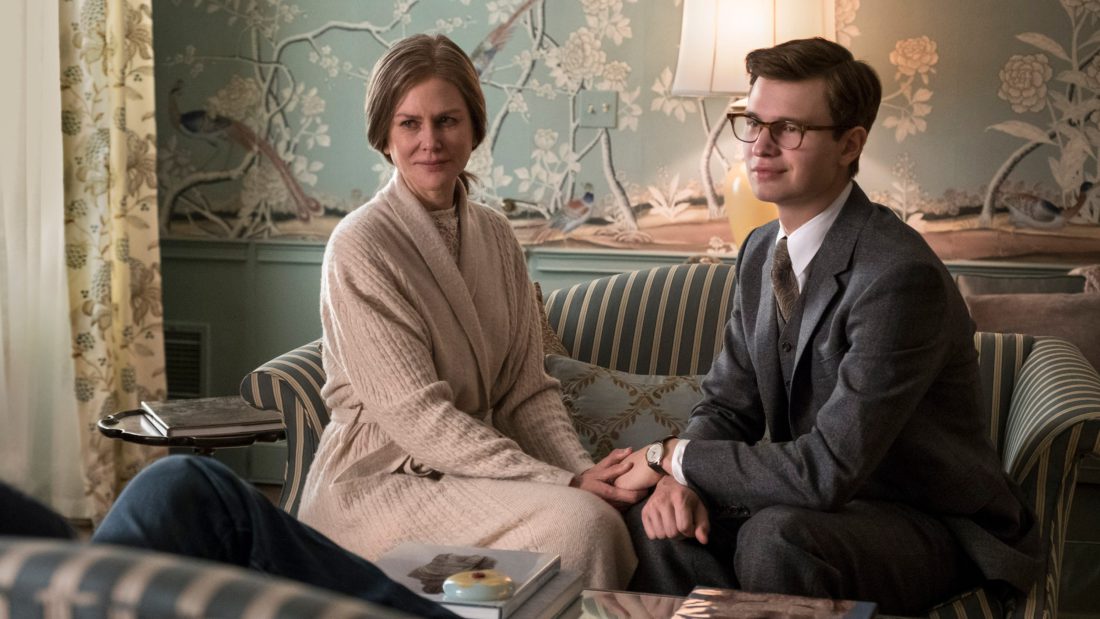It’s a thankless task, adapting a nearly 800-page contemporary literary masterpiece to the screen, but director John Crowley (Brooklyn) plows ahead with authority and constructs a passable Reader’s Digest gloss on Donna Tartt’s great novel.
The screenplay, by Serious Film adaptation master Peter Straughan (Tinker Tailor Soldier Spy, PBS’s “Wolf Hall”), boils down and reorders the narrative with remarkable seamlessness. The smartest decision, though it seems odd at the start, is removing the book’s first flashback sequence — when 13-year-old Theo Decker loses his mother in a terrorist bombing on a museum, in the chaos of which he also steals the tiny 400-year-old painting of the title — and spreading it throughout the film in fragments, like the painful memory it is to Theo.
Teen actor Oakes Fegley (Pete’s Dragon) makes a fine young Theo, a presumed orphan taken in by the rich and dysfunctional Barbour family, a matriarchy led by the icy but sympathetic Mrs. Barbour (Nicole Kidman, who colors within the lines this time out). The Barbours, though, are just a waystation on Theo’s journey, and it’s a long stretch before he reaches Las Vegas and meets his platonic soulmate, the Ukranian delinquent Boris (Finn Wolfhard, Netflix‘s “Stranger Things”).
The novel’s chief dichotomy is between the repressed, overthinking, insecure Theo and the id-driven, impulsive, charismatic Boris, and the movie captures a mild version of that. Played as adults by Ansel Elgort (Theo) and Aneurin Barnard (Boris), Theo is less of a mess than he needs to be, and Boris is less of a cyclone than he should be. In what might be termed the “Masterpiece Theatre” effect, Crowley and Straughan treat The Goldfinch with perhaps a touch too much reverence, capturing the essence of the story and its central themes without injecting them with an energy particular to the movies.
The film is chock-full of A-list actors, from Kidman to Luke Wilson, who does, in fact, imbue Theo’s schizophrenic father with a good dose of psychosis. Sarah Paulson, as a Las Vegas barmaid and schemer, suffers from the same diluting effect as the two Borises, and so is less manic (and less memorable) than she might have been. Jeffrey Wright, as Hobie, a furniture restorer who becomes Theo’s mentor — the counterweight to Boris in Theo’s life — makes the role his own but is prevented by his stature from becoming the novel’s gentle giant, one of recent literature’s truly brilliant benevolent forces. Hobie’s being half a head shorter than Theo shrinks the older man’s stature in both literal and figurative senses, though one instance of perfect casting is Denis O’Hare as a creep who tries to blackmail Theo over the missing painting.
Of course, the movie is meant to play chiefly to those who have not read the book. Such audiences are likely to come away from the story having followed its labyrinthian course well enough and still be curious about the book’s stellar reputation. Turning Theo’s long internal soliloquies into bits of dialogue may get across some of the book’s themes — the power of certain artworks to transcend time and make sense of tragedy, for one — but the filmmaking, however lyrical at times, doesn’t quite embrace that eloquence.
Which is not to say the movie hasn’t got fine moments. A shot of Theo embracing the Goldfinch painting as grief over his mother twists him into a fetal position is visually and emotionally powerful, and some of the photography in the desolation of a failed Las Vegas subdivision is gorgeous. The final replay of Theo’s museum memory has the power it needs largely because of the decision to withhold it until the end.
Still, overall The Goldfinch reminded me of the 1974 Robert Redford adaptation of The Great Gatsby: great cast, beautiful production values, respectful script, all the story beats in place — but no sustained spark of cinematic genius. For that, we had to wait 39 years for Baz Luhrmann to reconceive F. Scott Fitzgerald’s novel as a reflection of his own idiosyncratic cinematic sensibility. So maybe in 2058, a new Goldfinch movie will amaze and attract a new generation. Meanwhile, this Goldfinch serves as a respectable if somewhat subdued placeholder.



Before you comment
The comments section is here to provide a platform for civil dialogue on the issues we face together as a local community. Xpress is committed to offering this platform for all voices, but when the tone of the discussion gets nasty or strays off topic, we believe many people choose not to participate. Xpress editors are determined to moderate comments to ensure a constructive interchange is maintained. All comments judged not to be in keeping with the spirit of civil discourse will be removed and repeat violators will be banned. See here for our terms of service. Thank you for being part of this effort to promote respectful discussion.